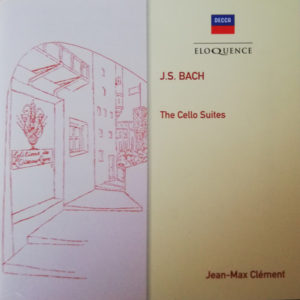
Jean-Max Clément. Bach Cello Suites. Review of streamed release Decca Eloquence available also as CD ELQ4828523 released 2019 and Remastered LP DMM LP43064.released 2017
Original LP release 1960 Éditions De L’Oiseau-Lyre – SOL 60016/7.
Recorded 13/14 May 1958.
There is no information regards venue of recording or instrument used .
Introduction.
There is remarkably little information available about this cellist who I believe is French and born in 1907. His recording of the Suites appears to be his only recorded output. It is apparent that collectors pay high prices for good examples of the original LP. The recording quality of the original release is very good but does the playing justify the sometimes four digit price?
In my search for more information, about this cellist I came across a review on the music web international site which gives as much information as there appears to be available. Furthermore, I believe it provides a fair assessment of the performance.
http://www.musicweb-international.com/
Sound quality.
Given the limitations of listening to CD quality streaming, the quality of the re mastering and original recording impresses and at no time impinges on the listening experience. Additionally, there is full sound stage with no echo. The recording captures well the cello tone and all its variations.
General points.
Clement plays with a very full tone and uses plenty of vibrato. He omits many repeats such that only the fifth movements of each Suite are played with all repeats. I noted that he plays the fifth Sarabande with a repeat of the first section but not the second section which was entirely musically satisfying as the first is half the length of the second, so conveying a sense of symmetry.
Specific points.
On starting at the beginning with the first Prelude I came close to consigning this performance to my “It doesn’t cut the mustard” list. This is a list of performances which I feel lack merit to the extent that I cannot be other than critical and therefore I feel it best that I don’t publish my review.
My reason for this negative first impression is that the Prelude starts very slowly which is not without precedent. However Clément then starts upping the pace as if he is being wound up or being hurried along. There isn’t a sense of give and take in the pace or even much rhythm. It all feels very laboured.
Fortunately things improve with the Allemande which he plays at a reasonable pace and a great variety of tone. Additionally, he displays light and shade and dynamics. There is marked emphasis of certain key points in each phrase with large dollops of vibrato. More improvement comes with the Courante which sounds concise and neat with a good sense of rhythm and not too much emphasis on the landing notes of each phrase. The playing of the Sarabande is with long legato phrases, some glissando and more vibrato which is not to my liking. The repeated first section is played very much more quietly and in more subdued fashion which adds interest. The Minuets, he plays with style and again variation with repeats. The Gigue is a bit of a revelation. It has a light touch, is well articulated and uses a syncopated rhythm which is very effective.
The second Prelude
The second Prelude is played in the same style as one might play Saint-Saens “The Swan”! The consequent movements conform to the same pattern as the first Suite as do the third and fourth Suites. However, the fifth Suite seems to flourish with Clément’s style and the Prelude is a highlight of the set. Clément plays the sixth Suite Prelude with impressive attack and is almost brisk! It would not be out of place in a much more modern release. The Courante indeed displays some intonation issues sounding sharp at time as commented in the music web international review. The final Gigue is an impressive and fitting finale. Without the repeats it is really all too short!
Conclusion.
This is a clear example of first impressions being highly misleading. My advice as is often the case is to audition to streamed files and if you can get past the first Prelude consider the recently remastered CD or even 2LP releases. The latter are available at under £100. I have to say the collectors are probably right in that an original release would be worth the high price on account of both rarity and quality!
Charles.